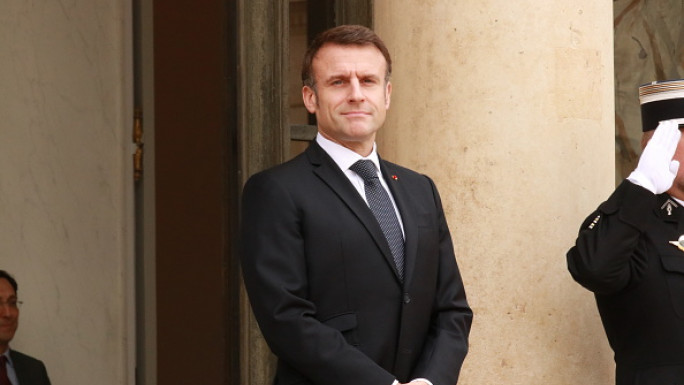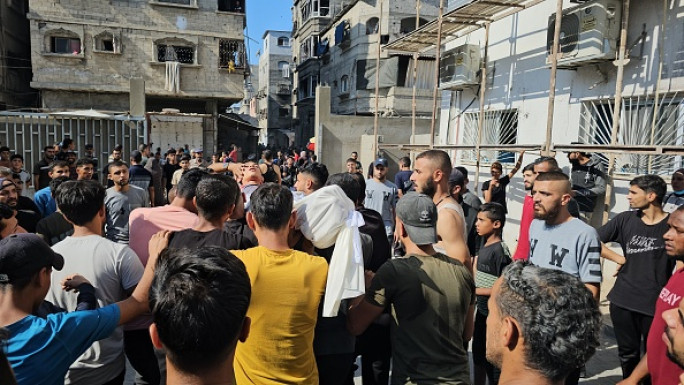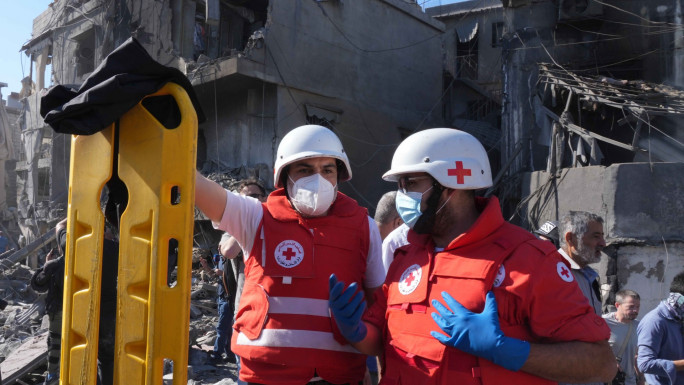
Like in Gaza, Israel is now repeating its systematic destruction of hospitals in Lebanon

Israel has expanded its bombing campaign in Lebanon to target hospitals and first responders, echoing the same rhetoric used to justify attacks on the healthcare system and its workers in Gaza.
Overnight in Lebanon, Israeli airstrikes hit near the country's biggest public hospital, Rafik Hariri University Hospital, in south Beirut with Lebanese authorities announcing on Tuesday that the death toll had risen to 13, including a child, with around 57 people injured.
AFPTV footage showed two plumes of smoke rising from Beirut's suburbs. AFP correspondents also heard two loud bangs before the strikes, which appeared to target the vicinity of the hospital's parking lot.
"To ethnically cleanse an area you need to dismantle the healthcare system in it"
British-Palestinian surgeon Dr Ghassan Abu-Sittah, who has witnessed Israeli military assaults on hospitals, paramedics, and first responders in Gaza, is now volunteering in Lebanon, where he sees striking similarities in the tactics and strategies of these attacks.
“The size of the country is bigger but the tactic and centrality of the strategy are identical. To ethnically cleanse an area you need to dismantle the healthcare system in it. When you look at the south of Lebanon and Beirut's southern suburbs that’s what they’re doing,” Dr Abu-Sittah, who is working at the recently targeted Rafik Hariri University Hospital, explained to The New Arab.
For Dr Ghassan Abu-Sittah, one of the initial tactics he observed in Gaza and now sees mirrored in Lebanon is the targeting of areas just a few metres away from hospitals.
Since the onset of its latest offensive on Lebanon, the Israeli army has carried out numerous attacks targeting ambulance and relief crews, particularly those associated with the Islamic Health Authority, resulting in the deaths of at least 120 medical and relief workers since September 23.
The Lebanese health ministry stated that those affected include the Islamic Risala Scout Association, affiliated with the Amal party, an ally of Hezbollah, as well as the Lebanese Red Cross and Lebanon’s Civil Defence service, which operates under the interior ministry.
The Israeli military has been targeting search-and-rescue teams, medical centres, and hospitals throughout Lebanon since it intensified its offensive against Hezbollah last month.
"They target areas near the hospital, bombing surrounding buildings so that debris and rubble pile up around the facility. The shockwaves from the blasts shatter windows, sometimes damaging medical equipment, making the hospital unusable and forcing it to shut down,” Dr Ghassan explained to The New Arab.
Following the Gaza playbook
Another tactic unfolding in the south is the systematic targeting of all trauma stabilisation field hospitals. Israeli forces have deliberately attacked these facilities, killing paramedics and doctors working there, revealing a clear strategy with the same intent as seen in Gaza, according to Dr Abu-Sittah.
Hospitals across Lebanon are buckling under immense pressure as they fight to provide essential healthcare amidst a surge of wounded patients.
From the crisis management team in the Ministry of Health in Lebanon, Fadi Itani explained to The New Arab that exhaustion is rampant among staff, who are working around the clock to meet an overwhelming demand, leaving the system in a precarious state as it grapples with the dual challenge of sustaining regular care while responding to the crisis.
In just two weeks, Israeli strikes forced 37 healthcare facilities to shut their doors in southern Lebanon and Beirut and on October 4, Israeli bombs struck hospitals in Marjayoun and Bint Jbeil, also in southern Lebanon.
As news of Israel's attacks on Lebanon’s healthcare facilities spreads, hospital staff are now scared to work. Israel's ongoing bombardment is wounding more than 100 Lebanese people per day, putting pressure on the country’s health facilities.
The healthcare system is on the brink of collapse with severe understaffing and dwindling resources. It is becoming a struggle to keep services running as medical supplies run low and health workers are pushed to their limits.
“When hospitals are taken out of service, as has happened in Lebanon where eight have already been shut down, it severely diminishes the capacity of the healthcare system,” Dr Abu-Sittah told The New Arab.
“In terms of equipment, consumables and medication and the sheer number of wounded that need complex and repeated surgeries, the system is just too fragile and its ability to provide the necessary medication and procedures is very challenging,” he added.
"We have witnessed a complete lack of accountability and moral courage from Western medical institutions in addressing Israel's attacks"
He also sees that there is a noticeable shortage of medical specialists as a third of doctors have emigrated due to the country’s economic crisis.
The targeting of first responders, healthcare workers and facilities constitutes a war crime under international law — but the question is, will the international community finally restrain Israel, or will it fail Lebanon as it did with Gaza?
"Unfortunately, this kind of delusional support from Western medical organisations and large associations results in biased sanctions against Israel, whilst not pressuring the country and its government to strictly adhere to international laws on the protection of health facilities and staff,” Dr Abu-Sittah.
"We have witnessed a complete lack of accountability and moral courage from Western medical institutions in addressing Israel's attacks."
Hospitals overwhelmed
Beirut hospitals are overwhelmed, while the World Health Organization director, Tedras Adam Gabria, said that Israeli attacks have made it impossible to deliver a large shipment of trauma and medical supplies to Beirut.
Israeli airstrikes killed 28 health workers in just one 24-hour period while shuttering dozens of hospitals and clinics.
Before the attack at the Rafik Hariri University Hospital, Dr Abu-Sittah had said that although the hospital has the capacity, it lacks the capability. “This is a huge hospital but it is very rundown, so although it has the capacity, it cannot treat a lot of the wounded,” he explained. However, following the attack near the vicinity of the hospital, this could deteriorate even further.
Israeli attack near the area [Getty]
In Beirut's Dahye, south of Lebanon and parts of Beqaa, experts, analysts and workers in the field are seeing the same strategies from Gaza unfold, with deliberate attacks on ambulances and paramedics, severely limiting the ability of medical teams to reach and save the injured civilians.
This not only increases the death toll but also heightens the suffering of those who could have been saved with timely medical intervention.
“In Lebanon patterns of the attacks on Gaza seem to be repeating, with first responders facing similar threats as they are finding themselves under airstrikes and bombing while attempting to provide life-saving aid in areas under attack,” Bilal Assaf, the head of media relations at the IHS Civil Defence told The New Arab.
The targeting of medical teams disrupts the chain of care and leaves many civilians without access to emergency services when they need them most whilst leaving dozens under the rubble.
The repetition of these tactics across different conflict zones suggests a calculated approach to destabilize communities by dismantling their access to essential medical care, further compounding the humanitarian crisis.
Hospital surgeons have to operate on a great number of children, who often need amputations, similar to Gaza where Israel's war resulted in thousands of amputations.
Dr Ghassan had commented on this crisis earlier this year, stating that: “Gaza was witnessing the biggest cohort of pediatric amputees in history.”
Bilal added, “Doctors are having to remove fragments of projectiles from dozens of bodies, including from children, while many are torn into pieces. We are having to amputate legs or arms when victims are fortunate enough to be found alive."
The spread of misinformation
Recently, Israeli army spokesperson Avichay Adraee, claimed that Hezbollah was using ambulances to transfer weapons. Bilal believes this a false attempt to justify their targeting of paramedics and their vehicles who are only trying to carry out their humanitarian work and save lives.
Official Lebanese sources have also said that the Israeli army targeted two aid trucks on Monday, October 14, while they were passing through the Ras Baalbek area. The trucks, which were flying Red Cross flags and had received UN approval to deliver humanitarian assistance, were struck by Israeli bombs, shattering their windows and injuring the driver of one.
This incident mirrors the patterns observed in the Gaza Strip, where similar attacks have raised concerns that aid trucks may be increasingly targeted under false pretences and pretexts in the future.
“Such unethical tactics actions not only jeopardise the delivery of essential humanitarian aid but also pose grave risks to the lives of those involved in relief efforts,” Fadi told The New Arab.
In many cases, the Israeli attacks do not allow first responders to reach the scenes of the assault to conduct rescue missions by directly attacking them. This happened on October 8 when at least 10 HIS firefighters were killed in the building they were staying at.
Bilal told The New Arab, “A few hours after the attack, the Lebanese Red Cross arrived at the site and discovered eight bodies. There were more victims trapped beneath the rubble, but search and rescue teams were unable to reach the area so the remains of several firefighters still lie beneath the rubble.”
Rodayna Raydan is a Lebanese British journalism graduate from Kingston University in London covering Lebanon
Follow her on X: @Rodayna_46







 Follow the Middle East's top stories in English at The New Arab on Google News
Follow the Middle East's top stories in English at The New Arab on Google News

